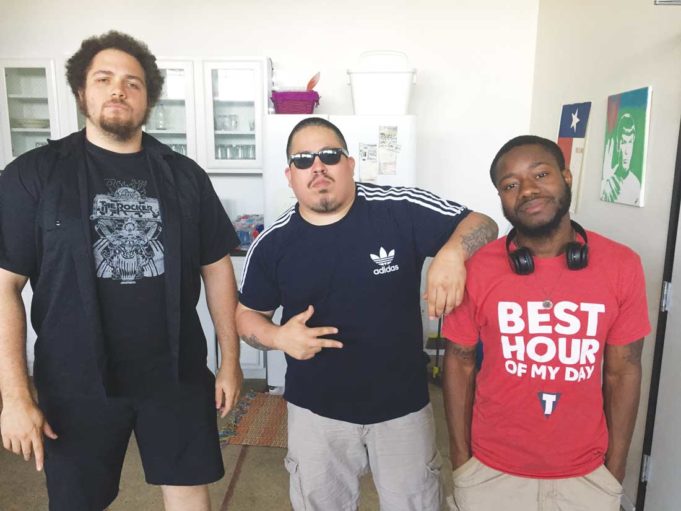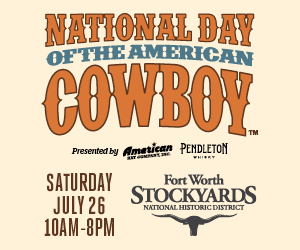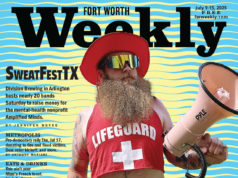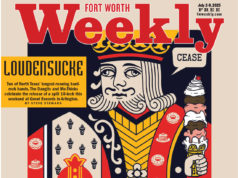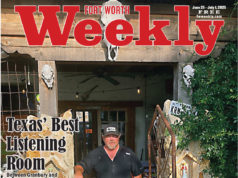Fort Worth’s hip-hop landscape has no shortage of talent, but your average local music fan doesn’t hear a lot of the exciting acts coming out of the 817. Venues are reluctant to book hip-hop shows because of a variety of factors – some legit, some leftover stigmas from a bygone era.
But outside of the West 7th area, the Near Southside, and the usual club-rich pockets of town, there are hip-hop niches that are exploding – particularly on the North Side and East Side.
To better understand our city’s lack of a cohesive hip-hop scene and why it’s so hard for rappers to get gigs, I gathered a few of the most respected guys in town to discuss these issues and more.
Lorenzo Zenteno, a.k.a. Smooth Vega, has been a staple of Fort Worth hip-hop for about two decades. As a rapper, he’s toured the country and released albums to wide critical acclaim. These days, he’s working behind the curtain as a promoter and booking agent. His company, Premier Live Experience, has snagged national acts such as The Game, Paul Wall, and Lil’ Flip. He also mentors young rappers on how to thrive in the ultra-competitive rap game.
Tornup is a prolific performer and recording artist. At one point last year, he was playing 15 shows a month all over the country. He released five EPs in a three-year span and is constantly writing and recording.
Wrex got his start working with Dru B Shinin’ and the Sphere Music Group. As a lyricist, he’s a verbal gymnast and an experimental songwriter. His last release, 2016’s the Chakra Flow EP, marked the beginning of his endeavor to effect positive change. If there’s a Fort Worth rapper with a political career ahead of him, it’s Wrex. – Eric Griffey
Fort Worth Weekly: The Weekly has featured a lot of really talented hip-hop acts that can’t seem to break into the mainstream nightclub scene in Fort Worth. Only in the last few years have we seen rap at the Live Oak Music Lounge, Lola’s Saloon, and the Rail Club, but that doesn’t happen very often. Why is it so hard for legit hip-hop acts to get gigs in this town?
Wrex: It’s a process. You have to prove that you can do it before you can actually get a place to do it.
Tornup: I was in a rock band, so there was that familiarity with me.
Smooth Vega: Part of it with hip-hop, it’s one of the most bootleg-run businesses. There’s not a whole lot of professionalism. Most hip-hop artists do a bad job of documenting what they’re doing and how they are doing it. If someone approaches you, we usually have a pretty good bullshit detector. It’s the same way with venues. They automatically put hip-hop in that category, because the people who have represented hip-hop up to this point haven’t really done it justice. What’s happened with the Fort Worth hip-hop scene is that people have a tendency to focus more on the problem than the solution. So you’ll see some of the rants online. These hip-hop artists have nothing in terms of publicity. I can go the venue and ask for a date, and now I have a company that works with national acts, so I have that credibility. But if I’m an artist or a manager working with an artist, that’s an uphill battle. It’s a matter of credibility at this point –– we lack it. But we don’t want to admit that we lack it. We don’t want to accept it and take responsibility and have to look in the mirror and figure out what we’re doing wrong. Venues don’t like to take chances, because at the end of the day, they’re still businesses.
Wrex: The stigma is that hip-hop is negative to most people. Unless you’re involved in the culture, you don’t really understand that there’s a positive aspect to it. People can get along, have a good time, and nothing bad is going to happen. Twisted Black is my godfather, and in Fort Worth in the ’90s and early 2000s, rappers were real gang members. So that stigma carries. If I come, and they look at me –– I’m black, and I have beard, that’s just life –– they’re like, “I don’t know if I want to work with you.” But to Vega’s point, once I have built a relationship with some of those people, they have all told me “yes.” It is building a relationship, and it is carrying yourself in a professional way. But the stigma is negative.
Weekly: So is racism an issue?
Wrex: I don’t even think racism is the issue. It’s the image that hip-hop is portrayed everywhere. People are, like, “I don’t want that here.” But that’s not all there is to hip-hop.
Vega: I would say the racism is there, but I wouldn’t go that far as to say that’s the main problem. I would say there’s a lack of credibility. Even the first time I went to the Live Oak, they didn’t really open their doors to me until [booking agent] Brooks [Kendall]. In the prior regime, they just ignored me. But I didn’t feel like I got as aggressive as I needed to get. I think just in general, how we as professionals need to be represented and how we need to be representing ourselves, the venues are not seeing that. I’ve started coaching younger guys on that. We need to do a better job of how we approach the situation. These venues have this idea that the bar doesn’t do good at hip-hop shows. Historically, they might be partially correct. The very first time I went to the Ridglea [Theater], they wanted eight cops there, because in their minds this was still the 1980s and hip-hop was all like NWA saying, “Fuck the police.” But it’s changed so much, and we need to make them aware. It’s not like that anymore. The Deep Ellum scene doesn’t have this problem. Trees, at one point, was pumping out more hip-hop dates than anything else. They’ve slowed down now because the powerbrokers in that area have moved on to bigger rooms. That’s why I’m able to go in there and do what I do. Artists don’t take enough accountability, but the venues also need to give artists the time of day. It has to start somewhere.
Weekly [to Tornup]: And you’ve had a different experience?
Tornup: First of all, I don’t think there’s any person who listens to just one type of music. That’s the big thing with me. I don’t want to insult people’s intelligence, even when they want me to. I’m also trying to get people to be more open-minded. Especially when you’re trying to book a tour, that’s when it really gets hard –– when you try to tell people you’re in a hip-hop band and you’re approaching the DIY circuit, where people only book one kind of music. It doesn’t have to be, “This is my lane.”
Weekly: So you wouldn’t necessarily book a venue and build a hip-hop bill?
Tornup: Yeah, I think it’s all music. It’s cool when everyone just does their thing.
Wrex: My last three shows, I was either the only one or just one of a few hip-hop acts on it. Those are the best shows.
Tornup: You don’t go home and just listen to one type of music. So if you can get the live experience to reflect that, it’s kind of dope.
Weekly [to Tornup]: I remember you had 15 shows a month. Obviously, you’re very talented, and you’ve earned it, but other guys are talented, and they’ve paid their dues, too. And they can’t get a gig.
Vega: That’s the professionalism aspect. How are these guys talking to the venues? I just did a show at the Rail Club, and 325 people showed up. People were really excited, and they were acting like they’ve never seen anything like it. But this isn’t new. I’m not reinventing the wheel. In order to really understand hip-hop for what it is, you have to understand your strengths and areas of deficiency. One of the reasons venues are reluctant to take on hip-hop acts is because [some hip-hop acts] don’t take it seriously. You’re not seeing enough hip-hop acts play in a live setting. You’ve still got guys rapping over vocal tracks. [The booking agents believe] it’s glorified karaoke at that point. But these guys have never been taught. … Someone told me something a long time ago, and I think it’s very true: Hip-hop is the new garage band. Everyone is setting up a mic and becoming a rapper. It’s even easier to do now. Hip-hop music is the only genre of music where you can go from dope dealer to superstar over night.
Tornup: If I was booking a venue and someone was emailing me, it would be a little hard to gauge whether or not that artist stands out or not. A big part is having your product right, getting it to where the work speaks for itself so it makes sense to have at a music venue. In order for it be a solid performance, you have to have some degree of musicality.
Weekly: Just the nature of hip-hop, it’s macho and intrinsically promotional. Traditionally, rappers aren’t shy about boasting their own accomplishments, real or imagined. So how can that urge to self-promote within a song be used to actually promote real-life gigs?
Wrex: It’s hard for people to come together because everybody wants to be the man. For me, that’s the hardest part. I can’t be online all day saying, “Look at me.” As a man, it’s against what I’m about. It sounds like an ego trip. My favorite rapper when I was a kid was Lil’ Wayne. He was like, “I’ve got the most hoes, most money, smoke the most weed.” That’s part of hip-hop.
Vega: I think there’s a great sense of entitlement there. But the grassroots approach never gets old. There’s an overall lack of education. There just aren’t a lot of smart business guys in rap. They’re not accustomed to talking to press. There are a lot of [predatory] promoters where artists have to pay to play. And these promoters are, like, we’re charging $2,000 to open for someone. And they really get that. Some of these younger guys were made to believe that’s how it works. And the people who taught them are telling them that. People still approach me all of the time, “How much does it cost to open up?” I tell them it doesn’t cost anything. With all of these bills where there are 30 acts playing for five minutes, I try to book artists for opening gigs, but they can’t even hold down 10 minutes. They don’t have that experience.
Weekly: One of the things I wanted to discuss is the hip-hop scenes that we as a magazine and me as a fan of hip-hop are missing. I’ve seen videos of shows on the North Side where there are 500 people packed into a club. Or I go on YouTube, and a rapper like Go Yayo has more than a million hits on a video. How do we in the media miss these acts? Where are they? Who are they?
Wrex: At this point, hip-hop has 70 sub-genres. There are young artists that don’t even rap anymore. They just Autotune their voice. That’s a genre, and people love it. Me, I consider myself a lyricist, and I like to rap about life and be really technical. I don’t try to please everyone. And that’s a genre. There’s thug life –– I don’t have to explain that. I saw you had Go Yayo in the paper, and I was surprised. They probably don’t know who you are, either.
Vega: I hate to be so blunt, but you have your black side, you have your Hispanic side, you have your white side, and then there is the battle scene. You’ll have some acts in the middle like Big Cliff and Lou Charles that have crossover appeal.
Wrex: One thing I’ll say is the Mexican community really supports each other.
Vega: There’s a scene within our scene where people will battle each other at an event. There’s a league. One guy, OG Percy, he’s an ex Crip, and he has Bloods and Crips battle. They have shows at Lola’s. OG Percy has a battle on YouTube that has more than 500,000 views. But it’s a niche scene. A guy started a league around here, Osama the Great. I feel like because I have an understanding of how those components work together, and that’s why I can get those acts in the same room and have a good turnout. I think the Fort Worth Weekly hasn’t been able to cover it, which is why I appreciate the conversation.



